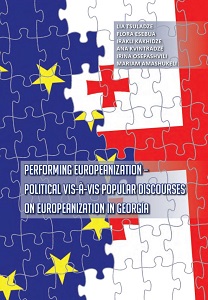Performing Europeanization – Political vis-à-vis Popular Discourses on Europeanization in Georgia
Performing Europeanization – Political vis-à-vis Popular Discourses on Europeanization in Georgia
Author(s): Lia Tsuladze, Flora Esebua, Irakli Kakhidze, Ana Kvintradze, Irine Osepashvili, Mariam Amashukeli
Subject(s): Civil Society, Governance, International relations/trade, EU-Approach / EU-Accession / EU-Development
Published by: CSS - Center for Social Sciences
Keywords: integration with Europe; Georgia;
Summary/Abstract: Based on the sociological perspective, the authors develop a typology of the “usage of European integration” that consists of three categories: Strategic usage (which implies “the transformation of resources in political practices” in order to achieve a specific goal such as influencing a political decision, getting access to political instruments, increasing one’s capacity of action, etc.) This is the most widespread strategy used by both governmental and non-governmental actors at both national and supranational levels. Cognitive usage provides political actors with certain analytical frameworks to enable them to comprehend and interpret a particular political issue. Therefore, it is used as a persuasion mechanism and implies the participation of various actors at both national and supranational levels. Legitimising usage is a mix of the abovementioned two categories and implies “reference to Europe as a way of legitimising national public policies.” This form is mostly applied by governmental actors using the so called “European rhetoric” as it refers to “European interests” or “European constraints.” Despite the fact that this legitimation is based on discourse, its effect is quite strong, as discourse has a significant impact on the flow of Europeanization (Jacquot and Woll, 2003, 6-7). Our research focuses on the discursive aspect of Europeanization as it also combines other aspects of the “usage of European integration” and encourages public attitudes towards this process. It is domestic political and popular discourses that provide legitimacy to Europeanization or deprive it of such legitimacy.
- E-ISBN-13: 978-9941-457-56-2
- Page Count: 232
- Publication Year: 2016
- Language: English
- eBook-PDF
- Table of Content
- Introduction

